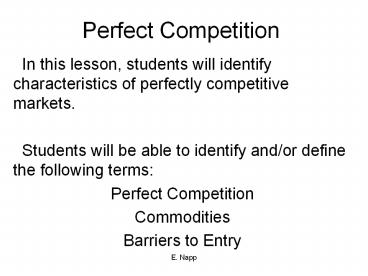Perfect Competition - PowerPoint PPT Presentation
Title:
Perfect Competition
Description:
Perfect Competition In this lesson, students will identify characteristics of perfectly competitive markets. Students will be able to identify and/or define the ... – PowerPoint PPT presentation
Number of Views:231
Avg rating:3.0/5.0
Title: Perfect Competition
1
Perfect Competition
- In this lesson, students will identify
characteristics of perfectly competitive markets. - Students will be able to identify and/or define
the following terms - Perfect Competition
- Commodities
- Barriers to Entry
2
A market is any venue where buyers and sellers
meet.
3
In a perfectly competitive market, a large number
of firms produce the same product.
4
Perfect Competition
- A perfectly competitive market has four
conditions - There are many buyers and sellers.
- Sellers offer identical products.
- Buyers and sellers are well-informed about their
products. - Sellers are able to enter and exit the market
freely.
5
Markets for fruits and vegetables are usually
perfectly competitive markets.
6
Commodities
- Commodities are generally sold in perfectly
competitive markets. - A commodity is a product that is the same no
matter who produces it. - Milk, petroleum, and apples are examples of
commodities.
7
Milk is milk. It is exactly the same regardless
of who sells it.
8
Barrier to Entry
- A barrier to entry is any condition that makes it
difficult to enter a market. - High start-up costs are barriers to entry.
- A great degree of technical knowledge can also be
a barrier to entry.
9
If opening a new business requires hundreds of
thousands of dollars, that high start-up cost is
a barrier to entry.
10
Needing a tremendous amount of technical knowledge
is another example of a barrier to entry.
11
Growing corn doesnt require a tremendous amount
of money or knowledge.
12
Opening a commercial airline industry requires a
tremendous amount of capital.
13
Few markets are perfectly competitive. Products
must be identical in a perfectly competitive
market.
14
Questions for Reflection
- List the four conditions of perfect competition.
- Define commodity and provide an example of a
commodity. - What is a barrier to entry?
- Provide two examples of barriers to entry and
explain why they are barriers to entry. - Why are few markets perfectly competitive?

